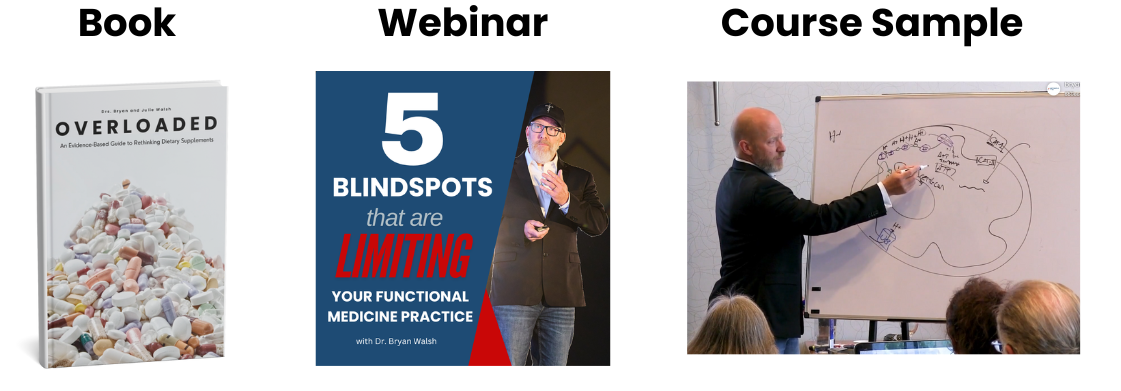Five Signs You Need to Learn (or Re-learn) Physiology for Health Practitioners
Jul 13
/
Drs. Bryan & Julie Walsh
The reality is, most health practitioners need to know more physiology. But first, two truths and a lie.
-
Most health practitioners are struggling in their business. (Truth)
-
You can run a successful practice where you are truly helping people with their health and not know physiology. (Lie)
Made it this far? Congratulations! You’re one of the few practitioners who realizes there’s more to learn than protocols. At this point, you may be asking yourself, do I need to learn more about physiology?
Rather than answering with a general (though resounding) "yes!", we put together this little checklist for you to self-evaluate.
WHY DO YOU NEED TO MASTER PHYSIOLOGY?
"It's the lightbulb that illuminates a practitioner's brain. It connects dots. It makes connections. It helps everything make more sense."
-Bryan Walsh
Here are five signs that you need to learn (or re-learn) physiology:
1. 🙋You’re always searching for the next best thing in Functional Medicine (lab tests, supplements, protocols, diagnosis).
It’s been said that there is nothing new under the sun, and we tend to agree. Most of the time, ideas are repackaged or recycled, but very rarely are they new. Think about it. When was the last time a supplement, or lab test, or pathway transformed your practice? If it did, you wouldn’t need more lab tests, or protocols, or information. If you’re looking for something, it means you don’t have it.
If you’re searching for the next flash-in-the-pan idea in Functional Medicine, that might be an indication you need more physiology.
2.🙋♂️ You get confused over conflicting advice in the industry and aren’t sure how to find a definitive answer yourself.
This industry is FULL of conflicting information. Vegan versus carnivore. Whole food supplements versus synthetic. Is choline/carnitine good for you, or will it give you a heart attack? Paleo or Keto? How is anyone supposed to figure it all out? It’s simple - the better you know physiology, the more you can read and interpret research studies AND the more you can think outside the box about elements that research hasn’t covered yet.
Physiology is the key that allows you to unlock answers that other people are arguing about.
3. 🙋 You repeat things you’ve heard, but when pressed, you cannot explain them further.
Have you ever been sitting with a patient, talking to them about the blood-brain barrier (or some other idea you learned in a seminar), when they ask you a question about it, and you don’t know the answer, so you fumble through some kind of explanation to appease them, but deep down you didn’t really know what the heck you were talking about? We have, and that’s a bad feeling.
Knowledge of physiology allows you to understand, explain, and communicate better with clients.
4. 🙋♂️ You give supplement recommendations based on the lab report recommendations or because a supplement company told you to.
Firstly, if you do this, you’re not alone. We’ve all done this. And while it might work for a while – a short while – there will come a time where it doesn’t work. Then what? Another new protocol? Another new lab test? When you understand physiology, you interpret labs differently, you diagnose things better, and therefore, you construct supplement protocols using your brain, and not someone else’s agenda.
5. 🙋 The last time you studied physiology was when you were in school, or you’ve never taken a physiology course before.
Physiology doesn’t change, but our understanding of it does. Even though there isn’t anything new under the sun, there are plenty of things we don’t know about, and upon learning them seems new. Feels new. If you learned physiology ten years ago and take a course in it now, we promise you light bulbs won’t just go off; fireworks will go off - big ones. We’ve heard this over and over from seasoned practitioners. Because they have experience and context for things, re-learning physiology doesn’t create “Ah-ha” moments, it’s more like, “Holy shiitake mushroom” moments!
Here’s the deal. It’s common for people to want the new, shiny, fancy, sexy, cool subject, supplement, pathway, or lab test. We get it. We’re human, too.
But the thing is, flashy tests and over-hyped supplements are not what builds a sustainable practice. A well-informed and educated practitioner is what builds a sustainable practice.
And a practitioner becomes well-informed and educated when they learn the science inside and out. Period.
We say that with confidence because learning the science in this way (even after years of school and more student loans than we can count) is EXACTLY what changed our business and our life. On top of that, in teaching other health practitioners over the past ten years, we've had the privilege of witnessing this same method change THEIR businesses and THEIR life as well.
Come learn with us, we teach a dose of Physiology in every course we produce. Browse our courses and try out a free module or two here.
Get Free Functional Medicine Education
Thank you!
Policy Pages
Join our mailing list
Get updates and special offers right in your mailbox.
Thank you!
Learn the PRAL Score of 30 Common Foods
(Based on Portion Sizes)
And get started evaluating your diet today!
Enter your email address below to subscribe to our mailing list and get the guide free!
Thank you!
Grab our free Reactive Hypoglycemia Playbook
Enter your email address below to subscribe to our mailing list and get the guide free!
Thank you!
See Inside the Program
Fill in your information below and we'll give you access to a free inside look into the entire program.
Thank you!
Get Free Stuff!

Fill in your information below and we'll give you our 100+ page eBook "Overloaded", our one hour "State of the Industry" webinar, and a sneak peek into one of our courses.
